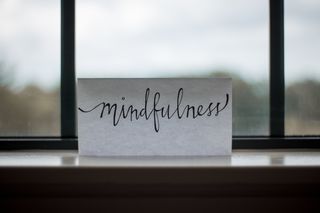Mindfulness
4 Simple Steps to Mindfulness
Here are a few easy ways to increase your attention and calm.
Posted March 22, 2018

Mindfulness is everywhere these days. There are now 48 hours of straight mindfulness Ted talks, the NBA is partnering with mindfulness apps, and story arcs on Emmy winning shows like "Crazy Ex-Girlfriend" are dedicated to musical numbers about "clearing one's mind." It seems no matter where you turn there is someone telling you how much time you are wasting on your phone, in your head, and at work all because you can't seem to practice more mindfulness. We all tend to imagine mindfulness as a difficult and challenging endeavor requiring time, commitment, and expensive sweatpants. Don't believe the hype-you don't need any of that to practice mindfulness.
Forget the two week silent retreat. We can start being more mindful right now.
Step one is to understand what's meant by mindfulness: It's about drawing our attention to the present moment in a curious and nonjudgmental way. Mindfulness teaches us to notice our thoughts and feelings when they drift to the past, stumble into the future, or begin to fill us with worry, regret, or numbness that distracts from what is going on right in front of us. Every time we can step away from the confusing Twitterstream of thoughts and emotions in our minds and focus on the present, we have a better chance at making the best possible choice in our lives.
The best part? We can't fail. When we get distracted and lose our focus on the present moment, we have an opportunity to pull back our attention and practice mindfulness. But we have to notice when our minds wander in the first place for all of this to work.
The best strategy to get better at noticing when you are exiting the present moment is to start practicing mindfulness in small ways as often as you can. Here are four simple tips to get you started:
Do it when it's easy. Most of the people I work with only become interested in mindfulness as a way to combat stress of difficult emotions. While that is a great idea, trying to start mindfulness in the middle of a a crisis is alot like trying to land a plane when you've never stepped into a flight simulator-There's gonna be way too much turbulence! Start by focusing on pleasant moments (e.g. that first sip of coffee in the morning, reuniting with a loved one after a long day, that endorphin filled post workout walk or drive home). You'll be ready to manage the harder stuff when life's challenges comes your way.
Pay attention to something you do every day. A great way to start is to pick one or two activities you do every day – such as brushing your teeth, drinking your morning coffee, riding the subway to work, or reading a book to your kids at bedtime – and get in the habit of paying attention to what you're doing. Your mind will wander, possibly within a few seconds, but don't sweat it. Just bring your attention back to your teeth, the latte, or the book.
Take a breath whenever you can. Breathing is a key mindfulness practice because it is something we always do out of necessity, and it's also a good way to bring our awareness back to the here and now. Taking three or four deep breaths (and paying attention to them) at any given moment can help you calm down and focus. Looking for a place to start? Check out this 3 minute breathing practice.
Anchor yourself to the physical world. Not feeling your breath? Sit down and notice how the chair you are sitting in feels under your body. Notice the different points of pressure where you butt and lower back touch the chair in different spots. Put your hands flat on the counter or a table, and notice how the hard, cool surface feels. Keep a soft, smooth stone handy and notice its weight as you hold it in your hand and run your fingers across it. These and similar actions will bring your awareness into the present.

You will notice that the more moments of mindfulness you practice on a regular basis, the easier and more instinctual it will become. As time goes on you will notice that you can slow down crucial moments in your day to improve their outcomes whether its an annoying client or a cranky toddler.
Now it won't all be zen moments and "Full House" orchestral endings. You will have moments where you wish you had been more mindful and handled things differently. But you'll also know that you can get back on track more quickly and with less pain and frustration than before.
Looking for something more in the way of mindfulness? Want to start a more formal daily practice? Check out apps like Calm and Headspace. If you want to learn mindfulness as a strategy for overcoming your stresses and challenges in life reach out to a mindfulness based mental health provider for a consultation.


